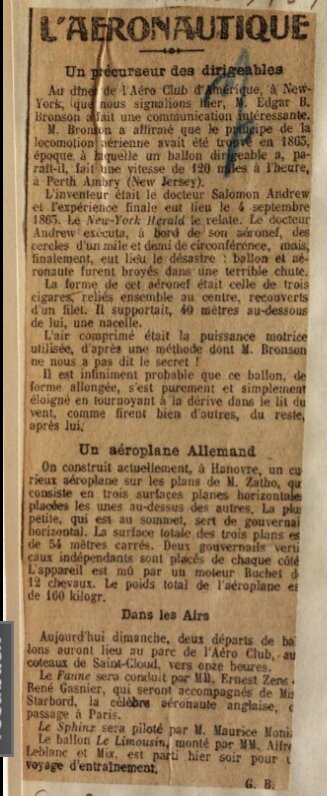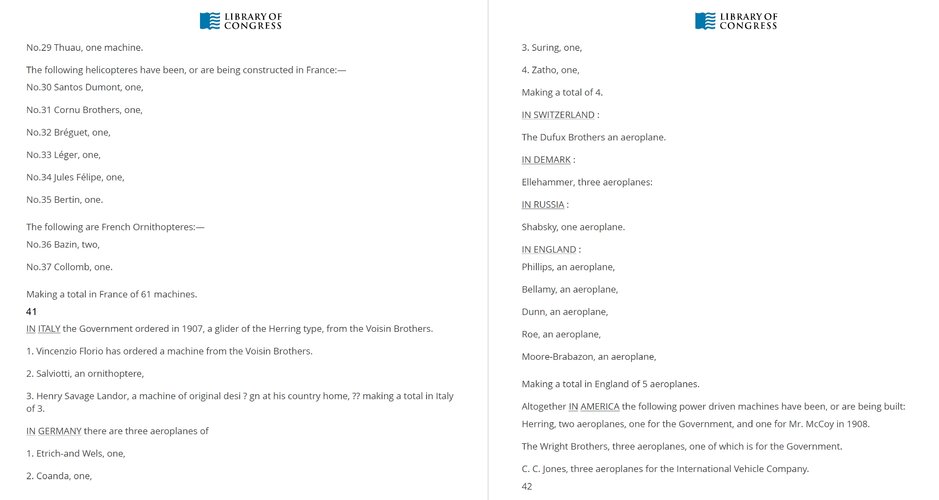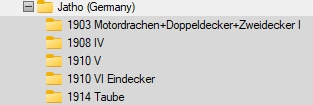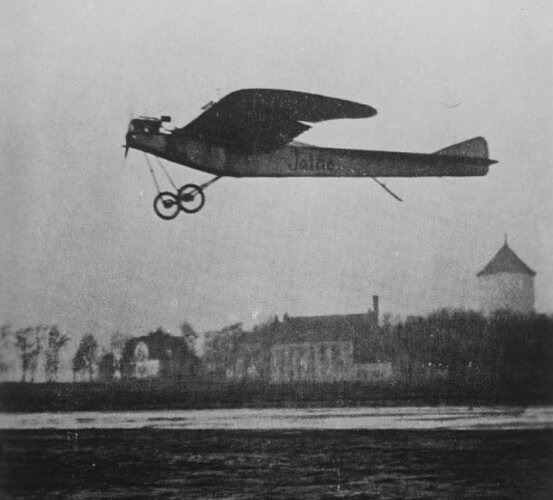I think this is a typo. It should probably be Jatho. The article says something about Hanover and that the triplane had a Buchet engine. Both fit the Jahto triplane exactly.
No typo here, just a different transcription of the same name. There is NO definite spelling for a surname but the one that was chosen on the civil registry of a certain country. Therefore it can vary widely, with numerous different spellings for the same name throughout the world. Add to that the fact that some migrant families prefer to keep the spelling of their names intact (resulting in numerous pronunciation issues, and usually a loss of the original one), while others prefer to keep the pronunciation intact (resulting in a necessary change of spelling).
The only spelling that must be considered valid is the one that appears on a birth certificate... Unfortunately I do not have Mr. Jatho's! We need to go to original German publications of the time to be certain of what the actual spelling was, and therefore what the pronunciation was as well, but my understanding here is that
Jatho is the correct German spelling. Therefore it ought to be pronounced
[jɑːtəʊ] (Yah-toh) — German is a very logical language when it comes to pronunciation: once you know how to pronounce every letter, you can virtually pronounce any word.
So why all the confusion, and the erroneous transcriptions "Zhato" or "Zahto"? A
possible scenario is that some journalists of the time didn't know it was a German name, or didn't know how to pronounce a German name, and therefore thought that the "j" in the name should be pronounced
[ʒ] as the French "j" (zh), instead of
[j] (y) as in German (and most Eastern European language). This would have led to Jatho being wrongly pronounced as
[ʒɑːtəʊ] (Zhah-toh). English-speaking journalists might have heard that pronunciation and wrongly transcribed it as "Zhato" and "Zahto" as a result. As I said, it is just a
possible scenario. You need to remember that until the last decade of the 19th century (which also corresponds to a time when school became accessible to many) there was no definite spelling for a name, and the same family name could be transcribed in different manners depending on who wrote it — and sometimes even differently within the very same official document!
For what it's worth, I already posted a topic in the designations section regarding the question of transcribing surnames (though I gave it a specific Cyrillic theme because it is the transcription of Russian/Soviet names that poses the most problems). I posted it there for a reason — and not just because I studied linguistics and love languages! —: it was to make forum members more wary of those sometimes delicate questions and the trouble they can induce when a name is transcribed or pronounced incorrectly. This here topic is a perfect example of why it is useful!
A small reminder:
The sound [j] is transcribed differently in each language:
- In German and Eastern European languages, it is transcribed with the letter "j", which is pronounced in all these languages as our "y". For instance, the name Яковлев will become "Jakowlew" (German, Polish), "Jakovlev" (Czech, Finnish, Hungarian).
- In English and most of the Western European/Latin languages, it is transcribed as the "y". For instance, the name Яковлев will become "Yakovlev", not only in English, but also in French, Romanian, Danish, Swedish, Spanish, Albanian, etc. (although, quite surprisingly, Italian transcribes it exactly like the Czechs and Hungarians!)
However, if the Cyrillic names tend to be transcribed variously according to each Western language, there is a strong tendancy for names already written with the Western alphabet to simply adapt proper names to the local versions: a German name like Jakub will probably just end up as "Jacob", its English/French equivalent, instead of "Yakub" or "Yakoub". The German name Junkers, which ought to be pronounced "Yoonkers" (English) or "Younkers" (French), is usually left "as is."
The sound [ʒ] is transcribed differently in each language:
- In English and many other Western languages, it is transcribed as "zh" as in the surname "Rogozharsky" (and it is also the sound you can hear in "mirage" and "vision").
- In French and Romanian, it is transcribed as "j", leading to the different transcription "Rogojarski".
- In Czech, Slovenian and in the Baltic languages, it is transcribed as "ž" ("Rogožarského" in Czech, "Rogožarski" in Slovenia/Estonia, "Rogožarskis" in Latvia/Lithuania).
- In Dutch, it is transcribed as "zj", hence "Rogozjarski".
- In Polish, it is transcribed as "ż", hence "Rogożarski".
- In Hungarian, it is transcribed as "zs", hence "Rogozsarszkij".
- In German — for lack of better letters — it is transcribed as "sch", hence "Rogoscharski".
So, as you can see here (and only sticking to Western alphabet letters and their variants), we already have SEVEN different ways of transcribing the same basic [ʒ] sound: zh, j, ž, zj, ż, zs, sch. Problems arise when someone interprets these local transcriptions as if they were from their own language.
To conclude, always remember that languages are not an exact science; they are living entities, constantly shifting, evolving, and full of imperfections.
















